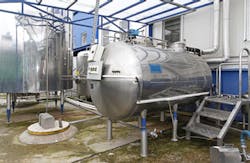An Oregon-based has been fined $56,532 for dairy wastewater violations at its products processing facility.
The Oregon Department of Environmental Quality (DEQ) said on May 27 that the Tillamook County Creamery Association had exceeded its wastewater discharge permit limitations for biochemical oxygen demand, total suspended solids and bacteria, specifically E. coli.
The processing facility discharges dairy wastewater to a large, privately owned wetland which subsequently flows through a small creek in a golf course and then into the Wilson River.
DEQ also cited the creamery association for violating water quality criteria for turbidity and unsettled solids, which it said have created deposits and slimy vegetation in the discharge area. The Department warned the company about these visible deposits in 2010 and 2012.
Failing to comply with a wastewater permit diminishes water quality and creates potential harm to aquatic life and human health, officials said.
The penalty announced by DEQ includes more than $38,000 in economic benefits that the Tillamook County Creamery Association is believed to have gained for not improving its dairy wastewater treatment sooner despite warnings.
However, the Department also took into account the company's efforts to prevent future violations by taking steps to upgrade its wastewater treatment system. It noted that the association has started work on extensive treatment system improvements, including the installation of new aeration pumps.
The Tillamook County Creamery Association has until June 10 to pay the fine or lodge an appeal.
A spokesperson for the company told the Tillamook Headlight-Herald that it had "a solid track record" of complying with the conditions of its dairy wastewater discharge permit.
"Unfortunately, and due in part to increased production at our manufacturing plant, we were in violation of some of those conditions in 2014. We aggressively responded with several hundred thousand dollars in equipment upgrades while also updating our testing procedures and protocols as well as our employee training," the spokesperson said, adding that the association is now operating in full compliance with the state's standards and is planning further improvements to its wastewater treatment plant.
